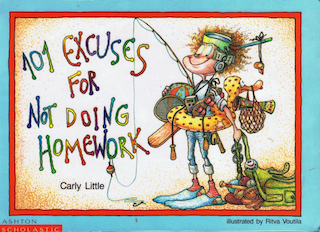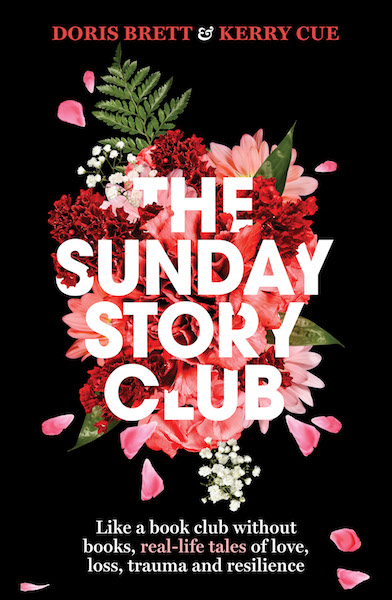 101 Excuses for Not Doing Homework by Carly Wood and Ritva Voutila
101 Excuses for Not Doing Homework by Carly Wood and Ritva VoutilaChildren's Non-Fiction
Published by Scholastic
For international rights contact Golvan Arts Management (https://www.golvanarts.com.au/contact-us)
When this children’s book was first published in 1990 it became an immediate success with school children. They loved the cheeky excuses and zany humour. This is no wonder as the author of the book, Carly Little, was herself a 14 year old school girl. The book’s illustrator, Ritva Voutila visited hundreds of schools around Australia and never encountered one school which did not have at least one copy in their library, though children often complained that it was always out on loan. The book sold over 200,000 copies through the nineties and early 2000s in Australia, New Zealand, the UK and Canada, but has never been published outside these territories.
The content is as fresh today as it was the day it was first published. The book is not only timeless, but borderless too: it appeals to children everywhere.
 The Sunday Story Club by Doris Brett and Kerry Cue
The Sunday Story Club by Doris Brett and Kerry Cue
The Sunday Story Club will be published in July 2019 by Pan Macmillan in Australia. Manuscript avaiable on request.
For International rights outside of Australia and New Zealand contact Golvan Arts Management (https://www.golvanarts.com.au/contact-us)
When was the last time you had a conversation that moved you, opened up new perspectives, made you think about your life, made you laugh uproariously or brought tears of compassion to your eyes? When was the last time someone really listened to you? When was the last time you really listened to someone else?
In this age of digital communication, with its emoji emotions and meticulously curated self-images there is a growing hunger for the old-fashioned nourishment of face to face connection and authentic human stories. For five years, Doris Brett and Kerry Cue have been running salons aimed at meeting this need.
The salons are places where people, many of whom have never met before, come together to reflect on their lives. The stories that emerge in the Salon are prompted by carefully-crafted questions that sidestep the usual narratives, to reveal something fresh and vital - often bringing new insights to old or forgotten experiences.
Personal stories cut through stereotypical thinking and forge true connections and understanding, an increasing rarity in our fractured and divisive era. The stories, large and small, that emerge from the salons are courageous, hysterical, thought-provoking, moving and inspiring. The energy created through listening to, and sharing, these stories is effervescent and participants invariably leave the salon feeling replenished, strengthened and renewed.
The Sunday Story Club recounts some of these stories and also guides the reader through the process of running their own salon, so they too can experience the life-enhancing magic of the salons.
Praise for Doris Brett's memoir, Eating the Underworld:
"Extraordinary...Its bravery, irony, humour and intelligence - everything shines through the transparent prose...a remarkable literary voice, or melding of three voices - the autobiographical, the poetic, and the allegorical."
~ OLIVER SACKS
- Heart of Violence: Understanding Violence and Its Roots by Paul Valent
For rights apart from Australia/New Zealand contact Golvan Arts Management (https://www.golvanarts.com.au/contact-us).
Violence stalks our lives. It saturates our news and media. It takes our breath away, and our ability to think.
Paul Valent is a child survivor of the Holocaust, who, since he was very young wanted to understand what happened to him. He wanted to prevent similar events engulfing children in the future.
In his chosen profession as a psychiatrist, and in his serendipitous lifetime’s journey, Valent encountered many contexts of violence, ranging from bullying, criminal and sexual violence to wars and genocides. As he came to understand and heal survivors of these traumas, he published extensively, and he came to be recognised as a pioneering leader in the field of traumatology.
In this work Valent turns his attention from victims to perpetrators of violence. Once again he draws on many contexts and disciplines, including latest neuroscience and his knowledge of traumatology.
As he did for traumatology, in this book Valent provides space, words, and a framework for the still nascent discipline of violentology. By the end of the book readers will be able to orientate themselves around violence, think about it, and better understand it .
Valent believes that violence is everybody’s business. Therefore this book talks without jargon, addressing professional and general audiences alike. Because everyone can relate to stories, and because stories illuminate hidden knowledge, Valent illustrates his points with many stories, his own interweaving throughout the book.
Violence is not an isolated part of the human experience, but it has one particular sibling - love. We kill not only for bread but also for love. Violence often grows out of the soil of lovelessness.
Readers of The Heart of Violence, then, may not only gain an understanding of violence but also a greater understanding of human nature.
Perhaps, as Valent hopes, this book will help tilt the world, if only a little, from ignorance and violence to understanding and love.
Praise for Paul Valent:
“Child Survivors makes fascinating reading and will be seen as possessing universal import.......Honour this splendid book.”
“As one of the pioneers in the treatment of trauma and grief and a Holocaust child survivor, Valent shares his outlook, which reflects a new, expanded view of trauma.”
“Valent emerges as a profoundly compassionate figure, a healer in the widest sense of the word...This issue of who is victim and who is perpetrator recurs in Valent’s book... Can good ever come out of bad? Paul Valent’s life and work provide an eloquent answer.”
~ SARAH KANOWSKI, Australian Book Review.
“..[Valent’s] merging of personal and professional histories is most poignant. Valent’s humanity and sensitivity shine through every chapter..”
~ JOHN RAFTERY on In Two Minds: Tales of a Psychotherapist in Stress Points. International Society for Traumatic Stress Studies.
“Right from the outset, you get the impression that Dr Paul Valent is just like that- the psychotherapist you want to have if you’re having a psychotherapist.”
~ RUTH WAYNRIB on In Two Minds: Tales of a Psychotherapist in Sydney Morning Herald.
